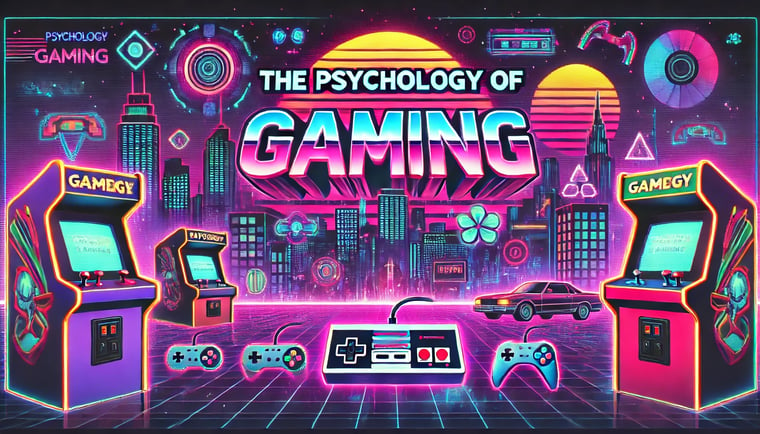The Psychology of Gaming: Why We Love Video Games
Video games captivate millions by blending entertainment, storytelling, and mental stimulation, creating an irresistible, immersive experience.
Jay Sangtani
11/22/20242 min read


1. The Joy of Escaping Reality
Life is sometimes so stressful, boring, or overwhelming. Video games give us a break from reality. For the time we are in a game, we could be anyone: a warrior, a detective, a racer, or even a farmer. This ability to explore a new world helps us forget our worries and gives us a chance to experience something exciting.
This "escape" is good in moderation. Studies show that playing video games can actually improve your mood and reduce stress. It's like a mini vacation for your brain.
2. The Thrill of Achievement
Video games are designed to make us feel accomplished. Whether it's leveling up, solving a puzzle, or defeating a boss, every small win releases dopamine—a chemical in the brain that makes us feel happy and motivated.
Psychologists call this the "reward system." Our brains love this feeling of progress and games are perfect at giving that to us. Unlike real-life goals, which can take weeks or months, video games offer quick rewards, keeping us hooked.
3. The Power of Social Connections
Gone are the days when gaming was a lone activity. Today, many video games let us play with friends or connect with strangers from around the world. For example, games like PUBG or Among Us bring people together even if they're miles away from each other.
Gaming helps create teamwork, communication, and sometimes even lifelong friendships. For many, social interactions are the highlight of their day.
4. The Joy of Control
The real world does not allow a choice in many matters. But video games do offer choices, paths, and results of our decisions. Exercising control over outcomes is thrilling and fulfilling. We can experiment and fail without facing the aftermath in the real world, boosting our confidence.
5. The Challenge to the Mind
Video games stimulate the brain as a puzzle game. They force our brains to think, plan, and react quickly. Strategy games such as Age of Empires or Candy Crush, which are similar to puzzle games, challenge the brain in different ways and enhance our problem-solving abilities.
According to studies, gaming can enhance memory, hand-eye coordination, and multitasking abilities. So, yes, gaming can be educational too!
6. The Art and Storytelling
Video games of the modern age are certainly more than just action adventure content; they are pieces of art. Stunning graphics to tear-jerking stories, games such as The Last of Us or Journey evoke emotions within them that we never thought of attaining in such a virtual world.
To many, the story is what keeps them coming back. It's just like watching a movie with you as the hero.
A Word of Caution
While gaming is refreshing, one must also strike balance in all things. Overindulgence might have an effect on the studies, sleep, and health in general. With proper limits, it ensures that gaming never turns into a burden to one's life.
Conclusion
We love video games because they offer excitement, challenge, connection, and a sense of achievement—all in one package. It helps to engage our brains, lets us feel good, and allows us to explore new worlds. Whether you play to relax, compete, or simply have fun, gaming has something for everyone.
So when you pick up that controller or tap on your phone screen, remember it's not just a game, it's an interesting kaleidoscope of psychology and fun combined.
